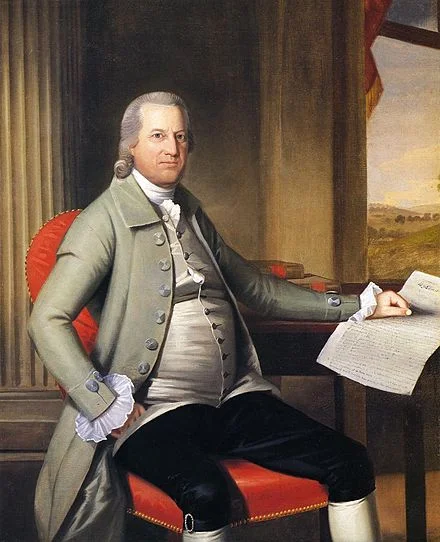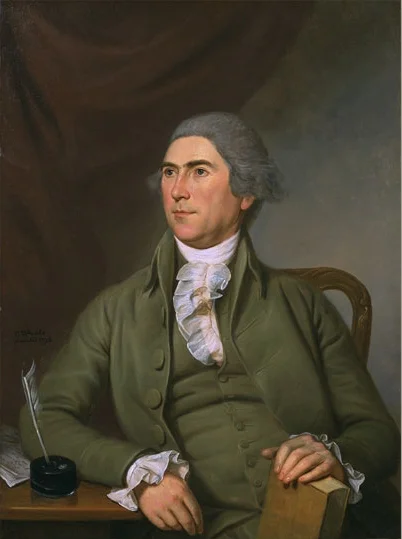Alexander McDougall Brings The Army's Demands To Congress
Although we think of Boston as the main area of protest against the Intolerable Acts of Great Britain, the truth is that most colonial cities had protests of their own. In fact, many of the actions Boston is known for were inspired by those of New York City.
At the heart of the Patriot Movement in New York was Alexander McDougall.
McDougall would rise to the position of Major General in the Continental Army. He was so trusted by his collegues that he was asked to go to the Continental Congress to state certain greivances they had.
Alexander McDougall
Alexander McDougall made a small fortune as a privateer during the French and Indian War. He made enough money to open up a merchant importation house which provided luxurious lifestyle.
McDougall, as a merchant, was effected by the Stamp Act, but became more involved in the growing resistance movement after the Quartering Act demanded the colonies provide housing for soldiers. The New York Provincial Assembly had simply not instituted any procedures for quartering the troops, so the Royal Governor disbanded it.
This action was too much to bare.
Alexander wrote To The Betrayed Inhabitants of the City and Colony of New York. This publication sparked the Battle of Golden Hill which, just a few months before the Boston Massacre, might be viewed as the first violence of the American Revolution.
Although Betrayed Inhabitants was published anonymously, McDougall was outed as the author and spent about half a year in prison.
Son of Liberty
After his release, McDougall became one of the leaders in New York’s Sons of Liberty.
He was one of the main players in the city's boycott on tea and successfully prevented any ships from unloading such cargo.
Alexander also participated in the local Committee of Correspondence and was elected to the new Revolutionary Government when it came into existence.
Major General
McDougall was appointed as a Colonel in the Continental Army just weeks after the Battle of Lexington and Concord. He served in the Battles of Long Island and White Plains.
Alexander spent most of the war in the Hudson River region, keeping an eye on British occupied New York City. He eventually achieved the rank of Major General and was placed in charge of West Point after the treason of Benedict Arnold.
Secretary of the Marine
McDougall was elected to represent his State in the Continental Congress but after little more than a month he resigned to accept the position of Secretary of the Marine. This office is similar to what we know today as Secretary of the Navy.
He was fit for this office due to a combination of experience in administrating the war effort and running mercantile/privateer business.
A Message to Congress
As hostilities ceased between the United States and Great Britain many officers became upset that they were not receiving their promised pay.
McDougall went to Philadelphia on behalf of these men to speak with the Continental Congress. He delivered Congress a letter signed by several high ranking Generals outlining their grievances and warning of what may happen if they were ignored.
Congress’ slow response to the letter led to the famous Newburgh Conspiracy, a gathering which almost grew into a mutiny of the army against Congress (only stopped by the prestige of George Washington himself).
McDougall, for his part, was sympathetic to the situation Congress found themselves in (it's hard to pay the troops when you're broke) and missed the events in Newburgh as he was still in Philly pleading the soldiers’ case.
Bank of New York
After the Revolution ended and everyone returned home, McDougall became the first President of the Bank of New York. Now known as BNY Mellon, this is one of the oldest existing banks in the world.
Although he passed away before the Constitution was written, McDougall’s bank would end up providing the United States in Congress Assembled it's first loan which was used to pay it's delegates.
Conclusion
McDougall was for New York similar to what John Hancock was for Boston: a wealthy merchant who stood against the unfair taxes which hurt his business.
He became an early political leader and soon thereafter an important general. McDougall played an important role in resolving the financial crisis for the Continental Army and then assisted to steady the economy of New York State.
If you've read this far then I hope you like brief biographies of American Founders. If so, please subscribe to our email list. I send out a new Founder every day and I will never sell your information or send you any garbage you don't want (other than a very infrequent update regarding this website).
My recommendation for a book to read if you want to learn more about Alexander McDougall is 'Alexander McDougall and the American Revolution in New York.' WARNING: we sell books through Amzaon.com, our affiliate. We do this because it is a trusted site which keeps things affordable for you while giving us a few pennies to help pay for space on the Interweb. HOWEVER, this book in particular is very rare and therefore extremely expensive. I recommend you DO NOT BUY IT. Instead, see if you can borrow it at your local library (they usually have a program to get it from another library if need be). This book is actually more interesting as a perspective on revolutionary New York than McDougall himself. I really like it though which is why I'm suggesting something I don't want to sell you on my site. That being said, if you particularly like this website and want to support it then go ahead and grab a copy, that would be extremely nice of you.






